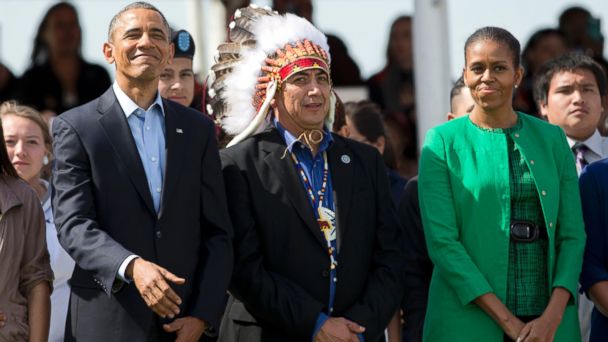Obama Brings New Promises to Native American Lands Amid Old Wounds

Manuel Balce Ceneta/AP Photo
In his first visit to Native American lands since assuming the Oval Office, President Obama today pledged new initiatives he said would push economic and educational progress into a community marked by generations of crippling poverty.
"I know that throughout history the United States often did not give the nation-to-nation relationship the respect that it deserved," the president said at a Flag Day event on the Powwow grounds of Cannon Ball, North Dakota, adding he would remain a leader who, "honors our sacred trust, and respects your sovereignty, upholds treaty obligations, and who works with you in a spirit of true partnership and mutual respect to give our children the future that they deserve."
Obama came to Cannon Ball, located on the Standing Rock Indian Reservation, with first lady Michelle Obama and Interior Secretary Sandy Jewell to announce an overhaul of the federal agency tasked with education for 183 tribal schools across the country. But the Department of Interior's Bureau of Indian Education has seen its pupils suffer the highest dropout rate any ethnic group in the United States.
Among the changes will be a transformation of the bureau from a direct operator of the schools to a resource provider for tribally-owned educational institutions. The plan also calls for technological modernization and a grant program for teaching certifications.
"I think we can follow the lead of Standing Rock's most famous resident, Chief Sitting Bull," the president continued. "He said, 'Let's put our minds together, to see what we can build for our children.'"
Dovetailing with the trip was an announcement by the Department of Housing and Urban Development that it would commit $70 million to improve housing conditions today. Some $10 million is set aside for harmful mold prevention and removal, and recipients can also use their money toward infrastructure and small business projects.
"Because young people should be able to live, and work, and raise a family right here in the land of your fathers and mothers," he told the crowd estimated at 1,800 people.
President Obama has only visited tribal land once before as a candidate in 2008. During that campaign Obama told members of Montana's Crow Nation he would make that election "about Indian country," promising to continue to heal old wounds built by centuries of federal mismanagement and widespread neglect. But it is a long hill to climb. Native Americans and Alaska Natives suffer violent crime and unemployment at a rate per capita twice that of the rest of the nation. In Cannon Ball alone only 63 percent of able residents are working, while boarded up windows plaster some dwellings.
Alcoholism and drug abuse are significantly higher than the national average. Native American youth are nearly three times more likely to commit suicide before the age of 25 as other ethnicities, according to the Centers for Disease Control and Prevention.
Prior to his remarks the president and first lady met privately with some of those youths at a nearby elementary school.
"Some bright young people like the ones we talked to today might look around and wonder if the United States really is thinking about them, and caring about them, and has a place for them, too," Obama admitted, adding that he and his wife understand what it was like to be, "on the outside looking in."
"There's no denying that for some Americans the deck's been stacked against them. Sometimes, for generations," he said. "But if we're working together we can break old cycles. We can give our children a better future. I know because I've talked to these young people. I know they can succeed."
After generations of federal promises and visits from only three sitting US presidents in nearly eight decades, many Native Americans would distrust the effectiveness of any new outreach from Uncle Sam. But the Obama administration has made some limited gains, mostly through tax relief and litigation, which the president recalled in his statement.
In his first year in office the president's administration settled a suit brought against the Department of Interior alleging mismanagement of profit derived from oil fields and mines owned by Native Americans, ending 14 years of judicial back and forth. Later, in 2010, the Department of Agriculture settled a $760 million class-action suit over reported discrimination against tribal ranchers and farmers in its farm loan program. The White House says it has settled 80 other suits brought by tribes against the federal government.
And in a separate move, the White House and its democratic allies on Capitol Hill included language in the 2013 reauthorization of the Violence Against Women Act that allowed tribal governments to prosecute non-Natives accused for domestic violence or sex crimes against a Native American woman on their land - a law enforcement mechanism formerly outside their jurisdiction. Native American women suffer among the highest rates of abuse in the country, and the vast majority of sex crimes, 86 percent, are perpetrated by non-Natives, according to the Department of Justice. Similarly roughly half of Native women have been beaten, stalked, or raped in their lifetime.
Today's Flag Day event was organized to honor Native American veterans. It featured traditional dancing and dozens of American flags, taken from family burials of those service members.
The Associated Press and ABC's Jake Lefferman contributed reporting.